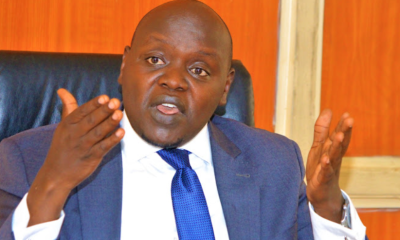News
Ruto’s Cybercrime Law Is Foolish Political War Against Kenyans
This is not a law about protecting the public from cybercrime. It is a law about protecting power from criticism. It is a desperate attempt by a failing regime to silence the country’s most vocal and politically awake generation, the Kenyan youth.

By Gitobu Imanyara
On the very morning we were waking up to the devastating news of Raila Odinga’s death, President William Ruto signed into law the Computer Misuse and Cybercrime (Amendment) Bill, 2024. A draconian piece of legislation that effectively criminalizes dissent.
The law states that if you post something that “offends” someone online, you could be fined up to Sh20 million or jailed for 10 years. Ten years for a tweet, a meme, a Facebook post, or a TikTok video that the State finds uncomfortable.
This is not a law about protecting the public from cybercrime. It is a law about protecting power from criticism. It is a desperate attempt by a failing regime to silence the country’s most vocal and politically awake generation, the Kenyan youth.
President Ruto’s obsession with control and fear is fast becoming the defining feature of his presidency. He came to power branding himself a “hustler,” the voice of the ordinary people. But that mask has fallen. What remains is a ruler terrified of the same young people he once courted, those who tweet, post, and protest because they have been denied jobs, dignity, and hope. Instead of fixing the economy, he is fixing his grip on power. Instead of creating jobs, he is creating jail sentences.
If Ruto fought corruption with the same zeal he uses to fight free speech, Kenya would be far. But he will not. Because corruption sustains his political system, while free speech threatens it.
The President and his allies understand something important that Kenya’s youth have changed the rules of political engagement. They no longer wait for mainstream media to tell their stories. They have built their own spaces on X, TikTok, YouTube, and Instagram, where truth travels faster than propaganda and where power can no longer monopolize the narrative. In those spaces, they have exposed government scandals, organized protests, and mocked hypocrisy. That is what scares Ruto.
By criminalizing “offensive” speech, the regime is not protecting civility. It is criminalising emotion. It is declaring war on anger, satire, and expression, the lifeblood of democracy. What does “offensive” even mean? The offense is subjective. To a tyrant, truth itself is offensive. To the corrupt, exposure is offensive. To the liar, facts are offensive. This law, in its vagueness, gives the State infinite power to decide who can speak and who must be silenced.
And yet, history has shown that suppression always births rebellion. Every generation that has been silenced has found new ways to speak. The late President Daniel Moi banned student politics in universities, and students turned lecture halls into underground movements. The state-controlled newspapers and dissidents like Raila Odinga, Kenneth Matiba, and this columnist printed their own from secret presses. Today’s youth don’t need printing presses. They have smartphones, millions of them.
President Ruto’s government may soon discover that fear does not kill freedom; it fertilizes it. The more you try to silence a generation, the louder they become. The more you criminalise their voices, the more creative and defiant those voices grow. You can not jail an entire generation’s imagination.
It is also worth remembering that social media is not a luxury for Kenyan youth. It is survival. It is how small businesses advertise, how artists build audiences, how freelancers find work, and how citizens seek accountability. It is the new town square, the new parliament, the new court of public opinion. To attack digital freedom is to attack the very lifeline of a generation that already feels betrayed by a broken economy and a corrupt State.
The new cyber law is, therefore, not just unconstitutional. It is immoral. It violates the spirit of Article 33 of Kenya’s Constitution, which guarantees every citizen the right to freedom of expression, including freedom to seek, receive, or impart information and ideas. It violates the legacy of those, like Raila Odinga, who fought and died for a democratic Kenya, where speech is free and citizens are not ruled by fear.
But beyond its illegality, this law is politically foolish. It signals a regime that is tone-deaf to the times.
The writer is a former MP and advocate of the High Court.
Kenya Insights allows guest blogging, if you want to be published on Kenya’s most authoritative and accurate blog, have an expose, news TIPS, story angles, human interest stories, drop us an email on [email protected] or via Telegram
-

 Investigations2 weeks ago
Investigations2 weeks agoBillions Stolen, Millions Laundered: How Minnesota’s COVID Fraud Exposed Cracks in Somali Remittance Networks
-

 News2 weeks ago
News2 weeks agoUS Moves to Seize Luxury Kenya Properties in Sh39 Billion Covid Fraud Scandal
-

 Investigations2 weeks ago
Investigations2 weeks agoJulius Mwale Throws Contractor Under the Bus in Court Amid Mounting Pressure From Indebted Partners
-

 News2 weeks ago
News2 weeks agoMAINGA CLINGS TO POWER: Kenya Railways Boss Defies Tenure Expiry Amid Corruption Storm and Court Battles
-

 Business4 days ago
Business4 days agoEastleigh Businessman Accused of Sh296 Million Theft, Money Laundering Scandal
-

 Business3 days ago
Business3 days agoMost Safaricom Customers Feel They’re Being Conned By Their Billing System
-

 Business4 days ago
Business4 days agoEXPLOSIVE: BBS Mall Owner Wants Gachagua Reprimanded After Linking Him To Money Laundering, Minnesota Fraud
-

 Americas2 weeks ago
Americas2 weeks agoUS Govt Audits Cases Of Somali US Citizens For Potential Denaturalization


















